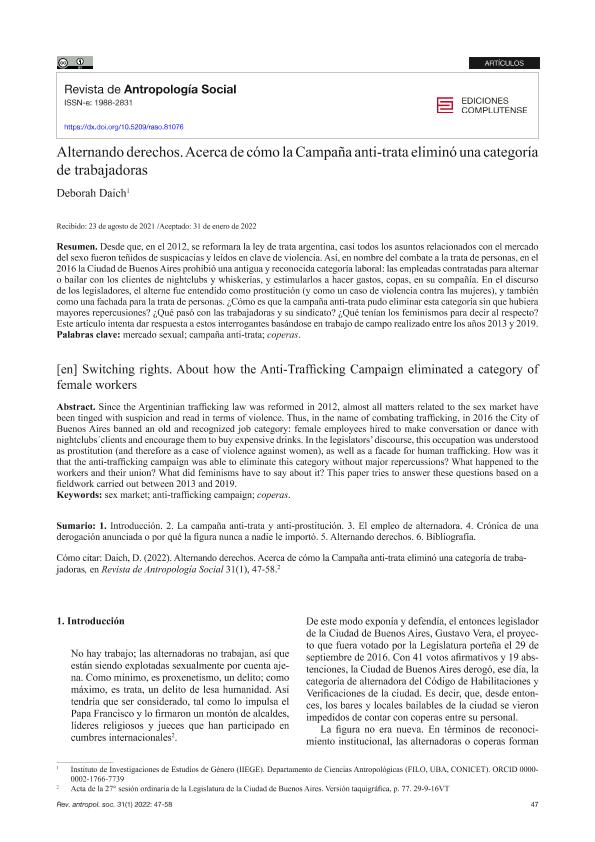Artículo
Desde que, en el 2012, se reformara la ley de trata argentina, casi todos los asuntos relacionados con el mercado del sexo fueron teñidos de suspicacias y leídos en clave de violencia. Así, en nombre del combate a la trata de personas, en el 2016 la Ciudad de Buenos Aires prohibió una antigua y reconocida categoría laboral: las empleadas contratadas para alternar o bailar con los clientes de nightclubs y whiskerías, y estimularlos a hacer gastos, copas, en su compañía. En el discurso de los legisladores, el alterne fue entendido como prostitución (y como un caso de violencia contra las mujeres), y también como una fachada para la trata de personas. ¿Cómo es que la campaña anti-trata pudo eliminar esta categoría sin que hubiera mayores repercusiones? ¿Qué pasó con las trabajadoras y su sindicato? ¿Qué tenían los feminismos para decir al respecto? Este artículo intenta dar respuesta a estos interrogantes basándose en trabajo de campo realizado entre los años 2013 y 2019. Since the Argentinian trafficking law was reformed in 2012, almost all matters related to the sex market have been tinged with suspicion and read in terms of violence. Thus, in the name of combating trafficking, in 2016 the City of Buenos Aires banned an old and recognized job category: female employees hired to make conversation or dance with nightclubs´clients and encourage them to buy expensive drinks. In the legislators’ discourse, this occupation was understood as prostitution (and therefore as a case of violence against women), as well as a facade for human trafficking. How was it that the anti-trafficking campaign was able to eliminate this category without major repercussions? What happened to the workers and their union? What did feminisms have to say about it? This paper tries to answer these questions based on a fieldwork carried out between 2013 and 2019.
Alternando derechos: Acerca de cómo la Campaña anti-trata eliminó una categoría de trabajadoras
Título:
Switching rights: About how the Anti-Trafficking Campaign eliminated a category of female workers
Fecha de publicación:
05/2022
Editorial:
Universidad Complutense de Madrid
Revista:
Revista de Antropologia Social
ISSN:
1131-558X
Idioma:
Español
Tipo de recurso:
Artículo publicado
Clasificación temática:
Resumen
Palabras clave:
ANTI-TRAFFICKING CAMPAIGN
,
COPERAS
,
SEX MARKET
Archivos asociados
Licencia
Identificadores
Colecciones
Articulos(SEDE CENTRAL)
Articulos de SEDE CENTRAL
Articulos de SEDE CENTRAL
Citación
Daich, Deborah Edith; Alternando derechos: Acerca de cómo la Campaña anti-trata eliminó una categoría de trabajadoras; Universidad Complutense de Madrid; Revista de Antropologia Social; 31; 1; 5-2022; 47-58
Compartir
Altmétricas




